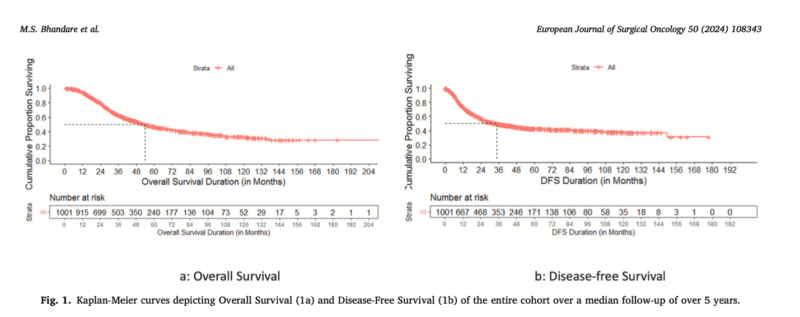
New Paper Alert! Impact of Pathological Complete Response on Long-Term Survival in Locally Advanced Gastric Cancer Patients Treated with Neoadjuvant Chemotherapy
Impact of Pathological Complete Response on Long-Term Survival in Locally Advanced Gastric Cancer Patients Treated with Neoadjuvant Chemotherapy
Authors: Manish S. Bhandare, Kaival K. Gundavda, Raghav Yelamanchi, Amit Chopde, Swati Batra, Manjushree Kolhe, Anant Ramaswamy, Vikas Ostwal, Kedar Deodhar, Vikram Chaudhari, Shailesh V. Shrikhande
Published in the European Journal of Surgical Oncology, on April 16, 2024
Introduction:
Gastric cancer remains a major health challenge worldwide, with a significant mortality rate. Multimodality treatment, including neoadjuvant chemotherapy (NACT) followed by surgery, is the standard of care for locally advanced gastric cancer. This study aimed to evaluate the predictors of pathological complete response (pCR) and determine its impact on long-term survival in a large cohort of patients with locally advanced gastric cancer treated with NACT and radical D2 dissection.
Design/Methods:
This retrospective study analyzed 1001 consecutive patients with locally advanced gastric adenocarcinoma who underwent radical resection following Neoadjuvant Chemotherapy at the Tata Memorial Centre, Mumbai, from January 2005 to June 2022. Patients were treated with various NACT regimens, including EOX (epirubicin/oxaliplatin/capecitabine), ECF (epirubicin/cisplatin/5-fluorouracil), and FLOT-4 (5-fluorouracil/oxaliplatin/docetaxel). Demographic, clinicopathologic, and treatment characteristics were analyzed, and the impact of pCR on overall survival (OS) and disease-free survival (DFS) was assessed.
What We Learned:
- The overall pCR rate was 9.49% (95/1001 patients).
- Non-signet and well-differentiated histology were associated with a higher likelihood of achieving pCR.
- Patients who achieved pCR had significantly better OS (5-year OS: 79.2% vs. 43.2% in non-pCR patients) and DFS (5-year DFS: 72.5% vs. 39.8% in non-pCR patients).
- On multivariate analysis, pCR (HR 0.30, p < 0.001) and completion of adjuvant chemotherapy (HR 0.502, p < 0.001) were independent predictors of improved OS.
- Signet-ring histology (HR 1.270, p = 0.025), linitis-like tumors (HR 1.776, p = 0.001), and higher lymph node ratio (HR 2.735, p < 0.001) were associated with worse OS.
- Patients who achieved pCR had a lower rate of recurrence (23.2% vs. 53.4% in non-pCR patients), with distant metastasis being the predominant form of recurrence in both groups.

Key Highlights:
- This is the largest study evaluating pCR rates and its impact on survival in locally advanced gastric cancer patients treated with NACT and radical surgery.
- Achieving pCR was associated with significantly improved OS and DFS, highlighting its potential as a surrogate marker for survival.
- Tumour grade and signet-ring histology were significant predictors of pCR, with non-signet and well-differentiated tumours being more likely to achieve pCR.
- Completion of adjuvant chemotherapy, in addition to pCR, was an independent predictor of improved OS and DFS.
- Factors associated with worse survival included signet-ring histology, linitis-like tumors, and higher lymph node ratio.
Key Takeaway Messages:
- Pathological complete response after neoadjuvant chemotherapy is a strong predictor of improved long-term survival in locally advanced gastric cancer patients.
- Future neoadjuvant strategies should focus on enhancing pCR rates to improve overall outcomes.
- Tumor grade and histology should be considered when selecting patients for neoadjuvant chemotherapy.
- Completion of adjuvant chemotherapy remains crucial, even in patients achieving pCR.
- Personalized treatment approaches and novel therapeutic strategies may be warranted for patients with poor prognostic factors, such as signet-ring histology and linitis-like tumors.
Summary by Amalya Sargsyan, MD
About OncoDaily
OncoDaily was founded in 2023. It is a US-based oncology media platform, which features the latest news, insights, and patient stories from the world of oncology. Within a short period of time it became one of the leading oncology media platforms globally.
OncoDaily gathers content from various sources, including social media posts from renowned oncologists from all over the world, news from oncology societies and cancer centers, patient and survivor stories, and career-related information for professionals.
The mission of OncoDaily is to empower patients, survivors, and professionals with the knowledge and inspiration they need to fight cancer. The motto of OncoDaily is “Cancer doesn’t take a day off – neither do we”.
-
Challenging the Status Quo in Colorectal Cancer 2024
December 6-8, 2024
-
ESMO 2024 Congress
September 13-17, 2024
-
ASCO Annual Meeting
May 30 - June 4, 2024
-
Yvonne Award 2024
May 31, 2024
-
OncoThon 2024, Online
Feb. 15, 2024
-
Global Summit on War & Cancer 2023, Online
Dec. 14-16, 2023
